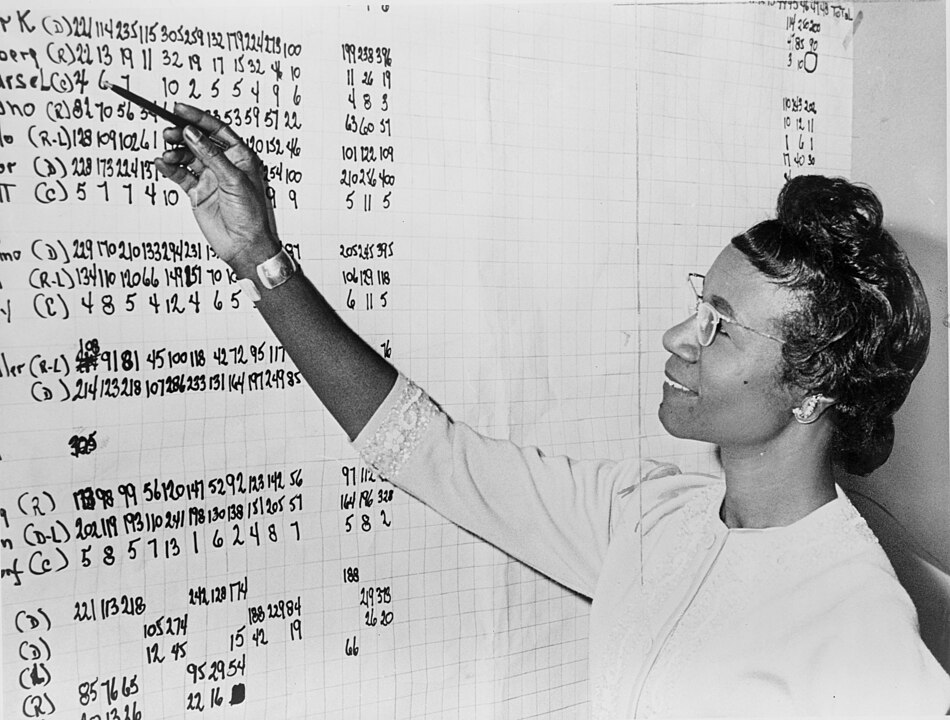
Shirley Chisholm reviewing political statistics in 1965.
Photograph by Roger Higgins, Library of Congress collection. Public domain.
The “unbought and unbossed” stateswoman who was a catalyst of change
March 6, 2024
On March 22, Netflix is set to release “Shirley,” a biopic about Shirley Chisholm, the first Black woman to be elected to the United States Congress. Chisholm was a political trailblazer who tirelessly represented minorities despite being thwarted by racism and sexism throughout her career. The movie stars Regina King in the lead role, alongside Lance Reddick, Terrence Howard, Lucas Hedges, and André Holland.
The prejudice against Black women she encountered persists today. Since 1968, when Shirley Chisholm became the first Black woman elected to Congress, 47 Black women representing 21 states have served in Congress. Of those, 45 have served in the House, and two have served in the Senate. In 2020, 25 Black women won House seats, making up 5.8 percent of all 435 House winners. Sen. Kamala Harris became not only the first female Vice President, but also the first Vice President of Color. In the 2022 midterm elections, Summer Lee became the first Black woman to represent Pennsylvania, the state where ABHMS is headquartered, in the House. However, 2022 also brought disappointments – none of the Black women running for governor or the Senate won their races.
Shirley Chisholm’s autobiography, “Unbought and Unbossed,” sheds light on why Black women continue to increase their representation at all levels of politics but also experience significant setbacks. Chisholm was born in 1924 in Brooklyn, N.Y., to working-class immigrant parents from Guyana and Barbados. Her talent for politics manifested early on – a top student in all subjects, she excelled at debating. Initially, recognizing ubiquitous systemic racism, she refused to enter politics and chose a career in early childhood education. “Racism is so universal in this country, so widespread and deep-seated, that it is invisible because it is so normal,” she commented. Nevertheless, the call to politics was hard to resist: in the 1960s, she joined local chapters of the League of Women Voters, the National Association for the Advancement of Colored People, and the Urban League, as well as the Democratic Party club in Bedford-Stuyvesant, Brooklyn.
In 1964 she became the second African American winning a seat in the New York State Assembly despite sexist opposition from other members of her political organization, the Unity Democratic Club. At that point, it seemed that nothing could stop her meteoric rise – in 1968, she won a seat in the House of Representatives. During her political career, she constantly spoke truth to power by taking up causes of various minoritized groups: the working poor, Haitian refugees, Native American land rights, and poor mothers. With the help of her former nemesis, George Wallace, she passed a bill that included domestic workers under the minimum wage law, which she later described as one of her greatest achievements.
Speaking up for the oppressed, like Shirley Chisholm did, is following in the footsteps of Jesus: “Truly I tell you, whatever you did for one of the least of these brothers and sisters of mine, you did for me.” (Matt. 25:40)
Speaking up for the oppressed, like Chisholm did, is following in the footsteps of Jesus: “Truly I tell you, whatever you did for one of the least of these brothers and sisters of mine, you did for me.” (Matt. 25:40 NIV) During her time in office, she was a faithful member of the Janes United Methodist Church in Brooklyn, N.Y., and had a special place in her heart for children and youth. She always appreciated the importance of the Black church in American politics. Shirley Chisholm was a Black woman who was a visionary well ahead of her time. She had the talent and skills necessary for presidency, but the political system was not prepared to affirm those gifts in a Black woman. When she sought the presidential nomination from the Democratic party in 1972, the first woman ever to do so, she was unsuccessful. Her candidacy was opposed by racist white Democrats and the predominantly male Congressional Black Caucus (of which she was a co-founder). Undeterred, Chisholm remained in Congress for seven terms, until she retired in 1983.
As we are on the cusp of another presidential campaign in which, most likely, two white men will be the contenders, Chisholm’s biography reminds us that other scenarios, even though as yet unfulfilled, exist. Americans are unenthused; the rematch between Biden and Trump will be animated by negative partisanship – a dislike of the other party’s candidate. In a racially and culturally diversifying America, an alternative is sorely needed.
Taking the white male-dominated world of politics by storm, Chisholm blazed the “Chisholm trail” for other Black and Brown Americans. “The door is not open yet,” she said once, “but it is ajar.” And there is a long line of women climbing the Chisholm trail led by Vice President Kamala Harris – our fellow American Baptist. Let us take heed of Reverend Henry Ward Beecher’s words that Shirley Chisholm once quoted: “Every tomorrow has two handles; we can take hold of the handle of anxiety, or the handle of faith.”
Rev. Dr. Anna Piela is an ordained American Baptist Churches USA minister. She is associate editor, The Christian Citizen, senior writer, American Baptist Home Mission Societies and co-associate regional minister for White and Multicultural Churches, ABC Metro Chicago. A Polish immigrant and a scholar of religion, she holds a doctorate in Women’s Studies from the University of York, UK. Her second book, Wearing the Niqab: Muslim Women in the UK and the US, was published in 2021.
The views expressed are those of the author and not necessarily those of American Baptist Home Mission Societies.


